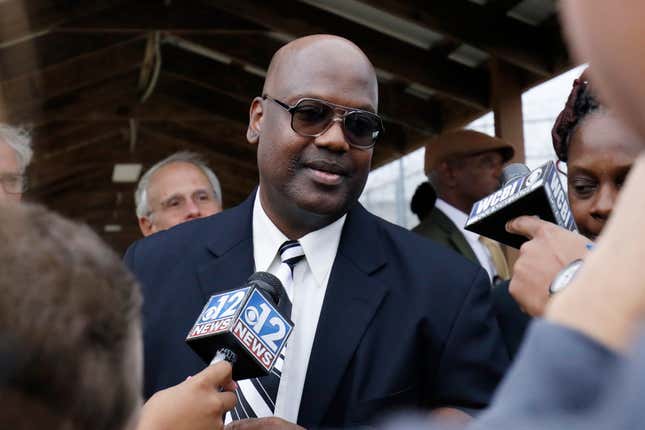
Curtis Flowers, a Black Mississippi man who wrongfully spent 23 years for the murders of four people, is suing the prosecutor who tried him six times in court.
The Associated Press reports that on Friday, Flowers filed a lawsuit against Montgomery County District Attorney Doug Evans and three investigators that worked with him. The suit alleges misconduct on behalf of Evans and the investigators, saying they ignored other potential suspects and pressured witnesses to “fabricate claims about seeing Mr. Flowers in particular locations on the day of the murders.”
From the AP:
“Curtis Flowers never should have been charged,” one of his attorneys, Rob McDuff of the Mississippi Center for Justice, said in a news release Friday.
McDuff said the killings “were clearly the work of professional criminals” and Flowers, who was 26 at the time, had no criminal record.
“The prosecution was tainted throughout by racial discrimination and repeated misconduct,” McDuff said. “This lawsuit seeks accountability for that misconduct.
Flowers was arrested after Bertha Tardy, Carmen Rigby, Robert Golden and 16-year-old Derrick “Bobo” Stewart were shot and killed in a furniture store owned by Tardy in 1996. Flowers was tried six times for the killings and had been in custody since 1997. Flowers was convicted twice for the individual deaths and twice for all four slayings, while two other trials ended in mistrials.
Through it all, Flowers maintained his innocence. The investigative podcast series “In the Dark” looked into his case, and not only did it feature a jailhouse informant on wax as he recanted his testimony that Flowers confessed to him, but it also presented an analysis that found that Evans, a white man, had a history of leaving Black people off of juries.
Thanks in part to the podcast’s findings, the U.S. Supreme Court in 2019 threw out Flowers’ conviction and death sentence from his sixth trial, and all four of his convictions were overturned. Earlier this year, a Mississippi judge ordered that the state pay Flowers $500,000 for the wrongful conviction.
The AP reports that the lawsuit against Evans doesn’t say how much money Flowers is seeking and leaves that decision up to a jury.

